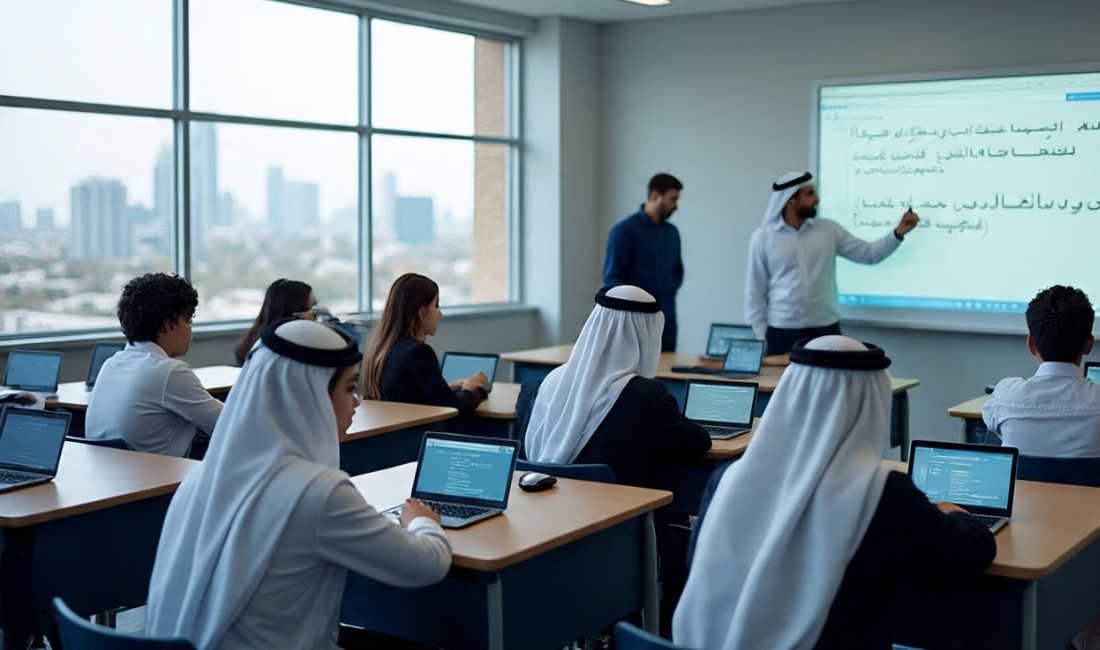Shaping the Future: How the GCC is Building a New AI Ecosystem

Artificial intelligence is no longer a distant ambition in the Gulf. It is rapidly becoming a central pillar of national development strategies across the region. The GCC countries are not simply investing in AI infrastructure. They are building the foundations of a sustainable, innovation-driven economy, one that reflects their own vision rather than replicating existing global tech models.
With long-term planning, strong public-private partnerships, and significant capital investment, the GCC is creating a thriving environment for AI adoption and innovation.
Strategic Vision Backed by Policy
At the heart of this transformation are national strategies that prioritize artificial intelligence as a driver of economic and social progress. Saudi Arabia’s Vision 2030 and the UAE’s National Strategy for Artificial Intelligence 2031 provide clear direction, supported by dedicated government bodies and policy frameworks.
David Boast, General Manager for UAE and KSA at Endava, points to a combination of factors now coming together in the region. These include leadership with a strong vision, a growing pool of capital, infrastructure development, and a willingness to embrace calculated risk. These ingredients, he notes, closely resemble what made global innovation hubs successful, only now adapted to the Gulf’s unique context and strengths.
Tassos Peppas, Regional Director for Middle East, Southeast Europe, Turkey, and Central Asia at Vertiv, emphasizes the shift from oil economies to digital leadership. He highlights the establishment of entities such as the UAE’s Ministry of State for Artificial Intelligence and Abu Dhabi’s growing role as a regional AI center.
Investment Driving Momentum
AI development in the Gulf is supported by substantial financial commitment. Saudi Arabia is launching large-scale initiatives including the 1.5 GW DataVolt center in NEOM, powered entirely by renewable energy and expected to be operational by 2028. The Humain project, supported by companies like NVIDIA, AMD, and AWS, adds further momentum. The Public Investment Fund has allocated between 40 to 100 billion dollars to AI, chip development, and data infrastructure.
In the UAE, projects such as the Stargate AI campus in Abu Dhabi and the MGX fund, backed by Mubadala, G42, Microsoft, and BlackRock, illustrate a similar scale of ambition. Microsoft is also expanding its Azure cloud regions in both Abu Dhabi and Oman, reinforcing the UAE’s position as a regional AI hub.
Purpose-built developments such as NEOM, Modon, and Spark in Saudi Arabia, and KEZAD, Masdar, and iCAD in the UAE, are equipping the region with the infrastructure needed to support AI at scale. Vertiv is contributing to this effort, working with technology partners like NVIDIA to design high-density, energy-efficient data centers ready for AI workloads.
AI Becomes a Business Imperative
While national strategies and infrastructure are essential, the private sector is playing a growing role in making AI part of everyday business operations. Boast notes a high level of trust among UAE executives in AI’s capabilities. Research from Endava indicates that four out of five decision-makers in the country already rely on AI for critical functions such as budgeting, hiring, and performance evaluation.
Access to modern, locally hosted data centers is helping businesses implement real-time analytics, predictive modeling, and secure data storage. For startups like Seez, this infrastructure is a game changer.
“Latency has dropped from two seconds to just 200 milliseconds,” says Andrew Kabrit, co-founder and Chief Product Officer at Seez. “This allows us to build AI applications that understand Arabic dialects, respond naturally, and offer localized insights based on behavior patterns and cultural trends.”
Faster access to GPU clusters also enables faster development cycles. According to Kabrit, the ability to test and iterate daily gives companies a clear competitive edge. He views this evolution as more than a technical milestone. “This is the foundation for a new kind of economy. In the last century, oil shaped the Gulf. This century, AI will.”
Location and Partnerships Strengthen Global Position
Geographically, the GCC is strategically located between Europe, Asia, and Africa, making it well suited for latency-sensitive AI applications and global data flows. This advantage has not gone unnoticed. Leading technology firms such as Nvidia, OpenAI, and Oracle are making long-term investments in the region.
The Stargate project in Abu Dhabi, developed in collaboration with Oracle and OpenAI, exemplifies how these partnerships go beyond infrastructure. They facilitate knowledge transfer, technical training, and long-term capacity building. “This blend of regional ambition and global expertise is a powerful combination,” says Peppas.
Developing Talent for the Long Term
While physical infrastructure has advanced rapidly, talent development remains a key challenge. According to Kabrit, the entire GCC region currently has fewer than 5,000 machine learning engineers. In contrast, China has over 300,000.
To close this gap, governments are investing in education and training. Saudi Arabia’s Future Skills and Digital Academy, the UAE’s National Program for Coders, and the Mohamed bin Zayed University of Artificial Intelligence (MBZUAI) are all part of broader efforts to strengthen the local talent pipeline.
Saudi Arabia’s One Million Saudis in AI initiative aims to significantly increase the country’s AI workforce. Meanwhile, the UAE’s Golden Visa program is designed to attract experienced international talent to the region.
Boast explains that talent development should happen in layers. First, professionals are needed to build the infrastructure: cloud engineers, cybersecurity experts, and sustainability officers. Then come data scientists, AI researchers, ethicists, and strategic thinkers to develop and scale solutions.
Making AI More Accessible
Despite the progress, accessibility and affordability remain important concerns. Kabrit says that gaining access to GPU power is still too difficult for many startups. “In a region with some of the world’s lowest energy costs, compute power should be cheaper and easier to access,” he says.
He believes that cloud providers must simplify deployment and offer more flexible pricing models that support experimentation. Tools should be as simple and scalable as those offered by global cloud giants, allowing startups to move quickly from concept to production.
Boast also highlights the need for more support for local startups, more partnerships between academia and industry, and regulatory frameworks that encourage innovation while managing risk. Retaining intellectual property in the region and building strategic autonomy will be important in the years to come.
A Growing Global Presence
The Gulf is emerging as a key global player in artificial intelligence, not by copying others but by building an ecosystem that reflects its unique strengths. With coordinated investment, strategic partnerships, and an increasing focus on talent, the region is taking meaningful steps toward becoming a global center for innovation.
The focus now is on maintaining momentum. That means ensuring infrastructure is accessible, education is prioritized, and regulation is adaptive. With continued collaboration among governments, businesses, and educators, the GCC has the potential to lead the next wave of global AI transformation.





